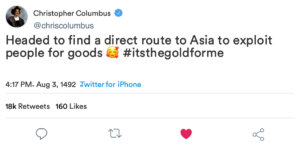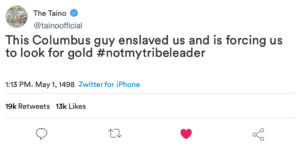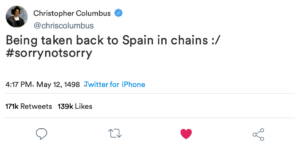In 1492, Christopher Columbus sailed to the Americas and changed the course of history forever. In this blog post, I will present this historical event as if it occurred on modern-day social media.
TikTok: https://vm.tiktok.com/ZMJahnnju/
*Note: I also chose to paint Columbus in a negative light, not glorifying him in the way that many historians do.
In the Age of Exploration, Spain was the main contender in the fight for riches and spreading Catholicism around Asia and Africa. The land route to Asia was long and strenuous, so sailors began to take ships around the tip of Africa to get there. Columbus, a navigator, sought to sail west around the Atlantic instead of having to sail around Africa to get to Asia. He had to find someone to fund his expedition, and after being denied by Portugal and England, Ferdinand and Isabella of Spain agreed to.


Columbus stumbled upon the Bahamian islands by accident, thinking it was the East Indies, and quickly decided that the people living there were weak enough to take over, even after they showed him kindness and traded with them. His personal journal from 1492 states “They … brought us parrots and balls of cotton and spears and many other things”.

Columbus established a settlement on Hispaniola, and enslaved many people, sending a present of 500 slaves to Isabella, who was terrified. He returned to the Americas several times until he was arrested for decimating and enslaving the Taino population. His journal describes of this experience “With fifty men we could subjugate them all and make them do whatever we want”.

Columbus died in 1506 after returning from his final trip to the Americas. He is often remembered as a hero for Spain and the person that led to America’s great success as a colony, but we need to rewrite this narrative. His “Columbian Exchange” took people and goods, and gave them in return disease and devastation. We must remember the indigenous people that lost their land and homes to him.
This assignment reminded me of the many readings we have done in class about scholarship expanding online, but specifically “In Public: The Shifting Consequences of Twitter Scholarship”. Obviously, my post is more of a humorous version of this, but the way that students and scholars can learn and spread knowledge is changing rapidly. I gave a brief synopsis of the story of Columbus stumbling upon the Bahamas in a few short tweets, so why shouldn’t researchers be able to post their findings on Twitter for the rest of the world to read and comment on?
References:
https://www.history.com/topics/exploration/christopher-columbus
“In Public: The Shifting Consequences of Twitter Scholarship.”